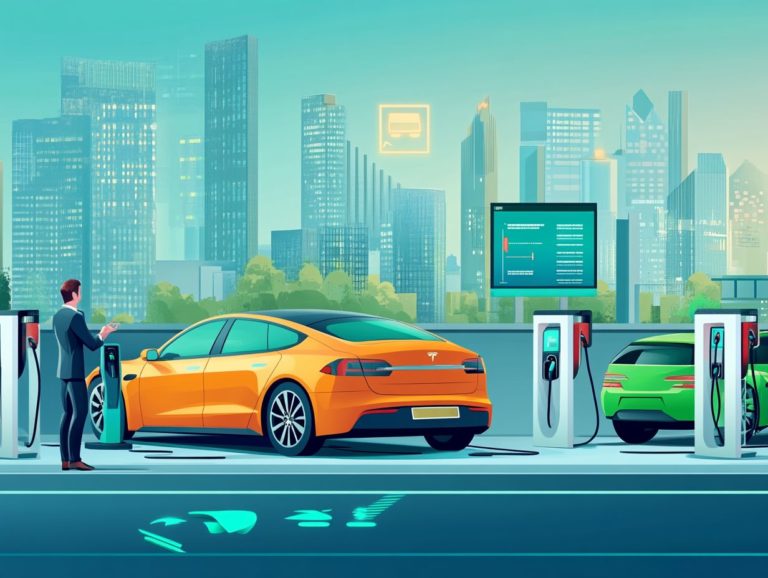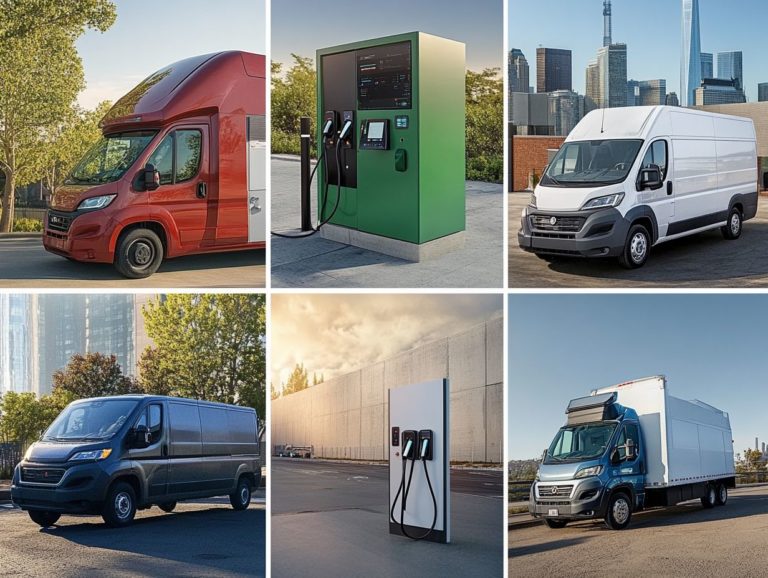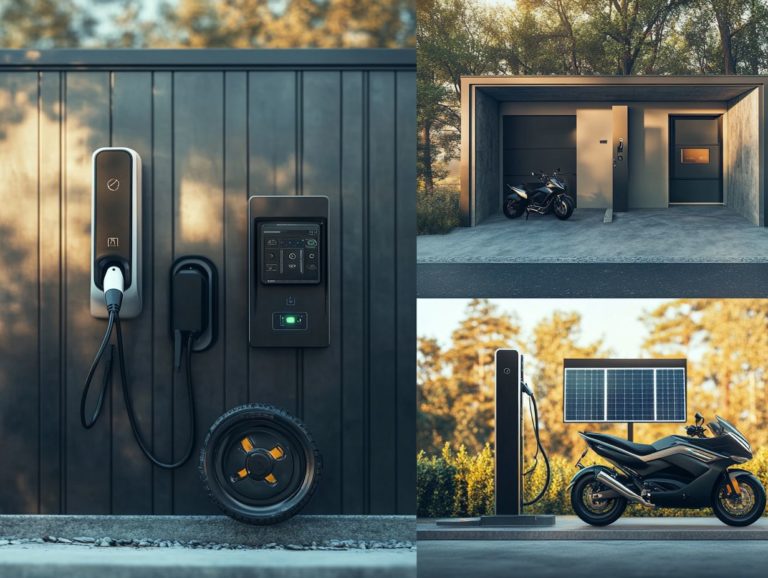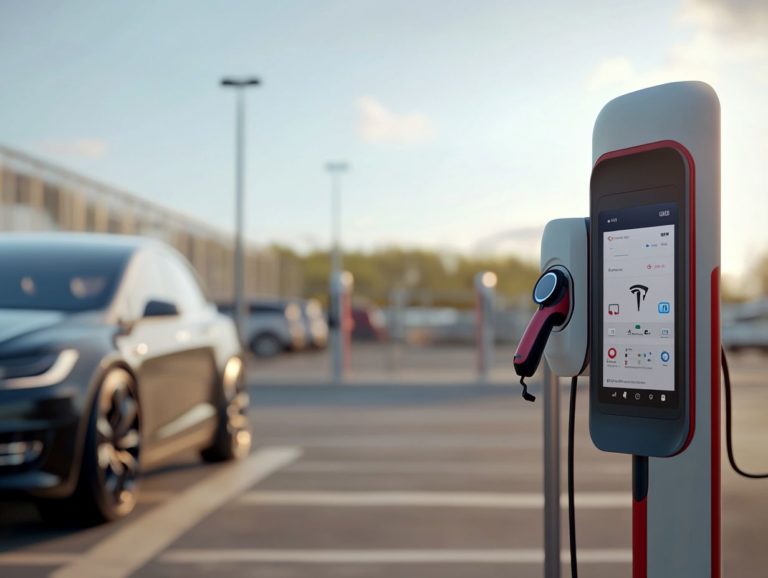charging costs: what you need to know as an ev owner
As electric vehicles (EVs) rapidly gain popularity, understanding the details of charging costs becomes crucial for every EV owner.
This article delves into the essential factors that shape these costs, including electricity rates and battery size. It also examines the various types of charging stations available to you.
You ll find practical insights on how to calculate your charging expenses and strategies to help minimize costs. Whether you re just starting your EV journey or have been driving one for years, this guide equips you to navigate the charging landscape with confidence and ease.
Contents
- Key Takeaways:
- Factors Affecting Charging Costs
- Types of Charging Stations
- Calculating Charging Costs
- Ways to Reduce Charging Costs
- Frequently Asked Questions
- What are the different types of charging costs for EV owners?
- How much does it cost to install a home charging station?
- What are the average costs of public charging for EV owners?
- What factors can affect the cost of charging an EV?
- Are there any ways to reduce charging costs for EV owners?
- What are the benefits of owning an EV in terms of charging costs?
Key Takeaways:
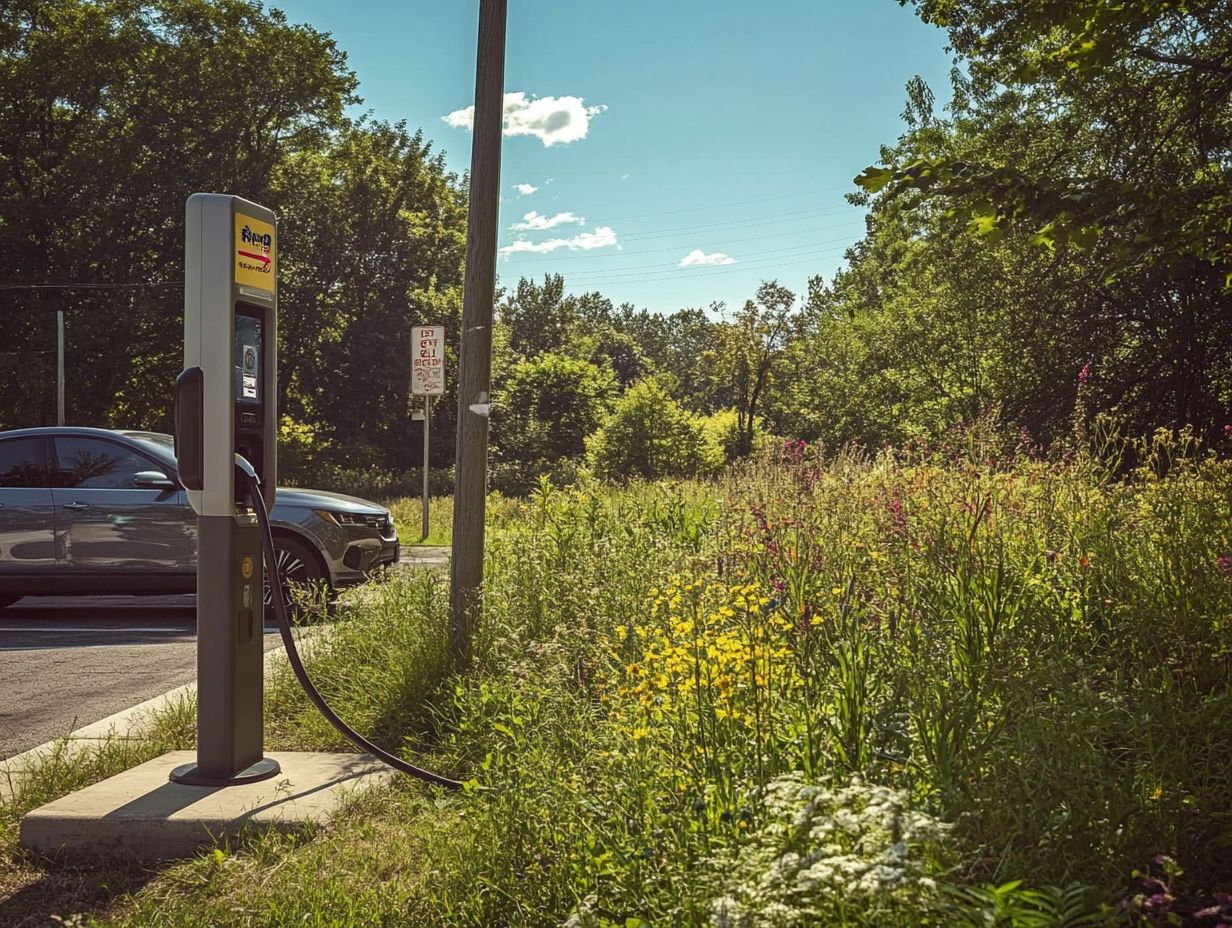
Know your local electricity rates and peak hours to save on charging costs.
Battery size and charging speed play a significant role in your overall expenses. Consider your driving habits and frequency of charging when choosing a battery and charging station.
Understanding kilowatt-hours a measure of electricity used and cost per kilowatt-hour is crucial for accurately calculating your charging costs. Keep track of your charging data and be aware of any changes in electricity rates.
Overview of Charging Costs for EV Owners
Understanding the details of charging costs for electric vehicle (EV) owners is crucial for optimizing your investment, especially when considering what to know before buying an EV charger.
Consider not just your home electricity rates but also the costs tied to public charging networks. To better understand these expenses, learn how to track EV charging costs, as public stations can have varying fees based on time, location, or the type of charging technology used like Level 2 versus DC fast charging.
These differences can lead to unexpected expenses if you re not keeping an eye on them. The choice of vehicle, whether it s a Nissan LEAF or a Tesla Model 3, significantly influences charging efficiency and duration, further shaping your overall costs.
By grasping these nuances, you can make informed decisions about when and where to charge, ultimately maximizing your savings and enhancing your EV ownership experience.
Factors Affecting Charging Costs
Charging costs for electric vehicles depend on various factors, such as electricity rates, battery size, and charging speed. Understanding these elements is essential for you as an EV owner to make informed decisions about your charging setup, including EV charging etiquette.
Whether you choose Level 1 or Level 2 chargers or prefer DC fast charging stations, each option has its nuances. Your charging habits can significantly influence your overall expenses, making it imperative to understand time-of-use rates and prioritize energy efficiency.
Electricity Rates and Time of Use
Electricity rates and time-of-use pricing are essential factors that shape the overall charging costs for EV drivers. As you navigate electric vehicle ownership, understanding EV charging stations and the different pricing structures becomes paramount.
Strategically shifting your charging sessions to off-peak hours typically late evenings and early mornings can significantly cut costs. This thoughtful timing eases the financial strain of charging and promotes more efficient energy usage.
Over time, these savings can add up, positively impacting the total cost of ownership for your electric vehicle. By taking advantage of time-of-use rates, you can reshape the economic landscape of EV ownership, making it a crucial element in your budgeting strategy.
Don t miss out on saving money understand your local rates now!
Start monitoring your charging habits today and watch your savings grow!
Battery Size and Charging Speed
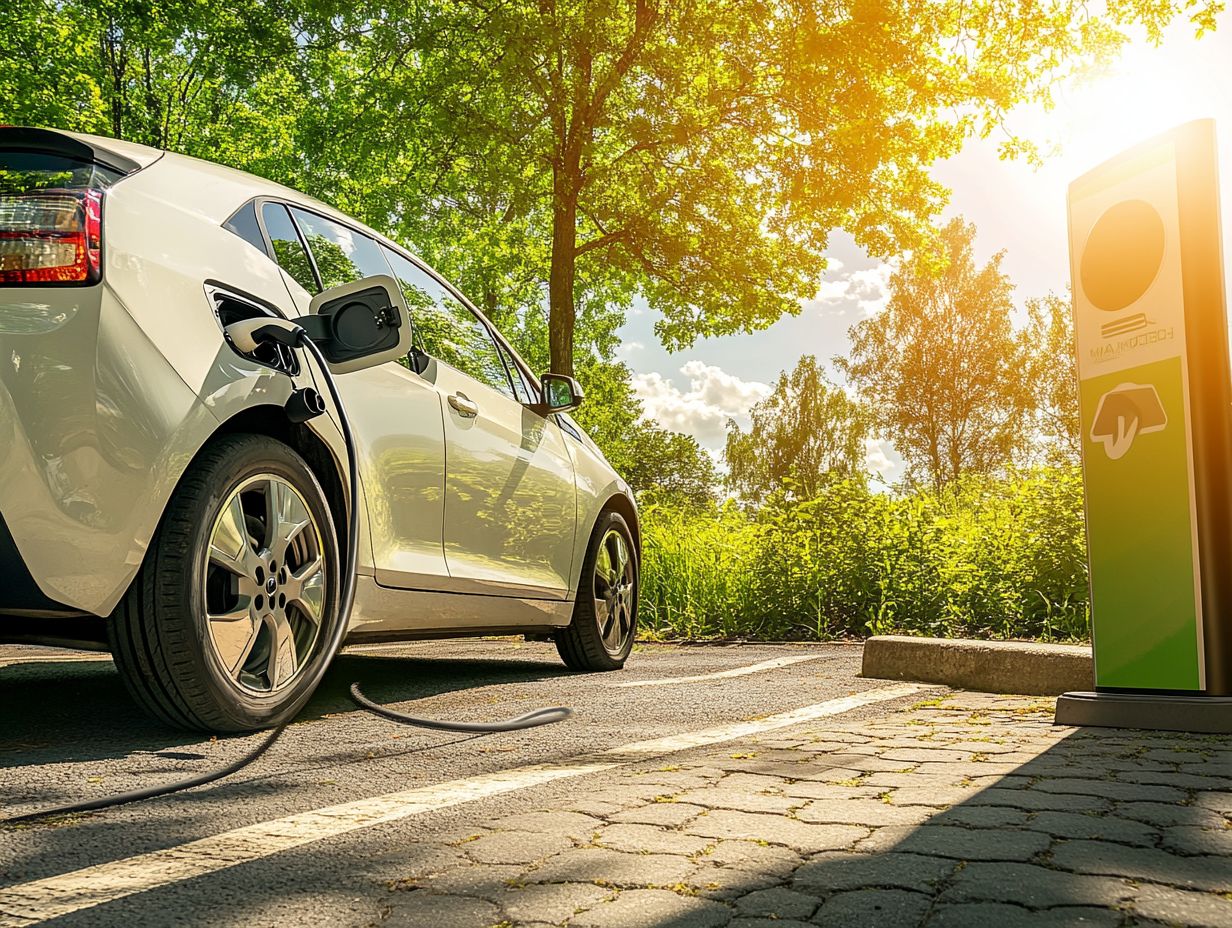
The size of your electric vehicle s battery plays a crucial role in determining both your range per charge and charging speed. While larger batteries may provide an impressive vehicle range, they can also take longer to recharge, particularly when using Level 1 or Level 2 chargers.
Familiarizing yourself with charging technologies, like DC fast charging (a quick way to recharge your EV), is essential for optimizing your EV charging experience.
With the Hyundai IONIQ 5, you’ll enjoy over 300 miles on a single charge. Perfect for those epic road trips! However, keep in mind that charging speed varies by charger type. At a Level 2 station, you might be looking at several hours for a full charge, while a DC fast charger can do the trick in under an hour.
On the other hand, the Tesla Model 3 offers various battery options, with the Long Range version also providing a similar driving range. What sets it apart is Tesla s extensive Supercharger network, enabling you to recharge quickly while on the move.
As a potential buyer, weigh these factors carefully, as they have a direct impact on your convenience and overall driving experience.
Types of Charging Stations
As an electric vehicle owner, you’ll find a variety of charging stations tailored to meet your distinct needs and preferences.
Level 1 chargers provide a simple home charging solution, though they are considerably slower compared to Level 2 and DC fast chargers, which cater to those who require quick and efficient charging while on the move.
Understanding these charging options helps you optimize your strategy and manage costs better.
Level 1, Level 2, and DC Fast Charging
Level 1, Level 2, and DC fast charging are the three main charging technologies available for electric vehicles, each tailored to different needs.
Level 1 charging is the slowest option, typically utilizing standard home outlets. It’s the go-to for overnight charging at home especially if you only drive short distances each day.
In contrast, Level 2 chargers with their 240-volt supply can deliver a full charge in just a few hours. They re perfect for residential setups and commercial locations like shopping centers or offices, offering a quicker solution without lengthy waits.
Now, if you re on the move and need to minimize downtime, DC fast charging stations are your best friend. They offer rapid power, recharging your EV up to 80% in about 30 minutes or less. This technology is a game changer for long-distance travel you can t afford to miss out!
By understanding the nuances of these charging options, you can make informed decisions about your charging infrastructure, striking the perfect balance between convenience, cost, and installation complexity.
Calculating Charging Costs
Calculating your charging costs is essential for grasping your ongoing expenses as an electric vehicle owner, and understanding EV charging networks can help you navigate this more effectively.
By analyzing the cost per kilowatt-hour and the total kilowatt-hours consumed during your charging sessions, you can gain valuable insights into your energy efficiency and overall cost management.
This knowledge gives you the power to make informed decisions about your charging habits, enabling you to minimize unnecessary expenses and optimize your EV experience.
Start tracking your charging costs today for a smarter, more efficient EV experience!
Understanding Kilowatt-Hours and Cost per Kilowatt-Hour
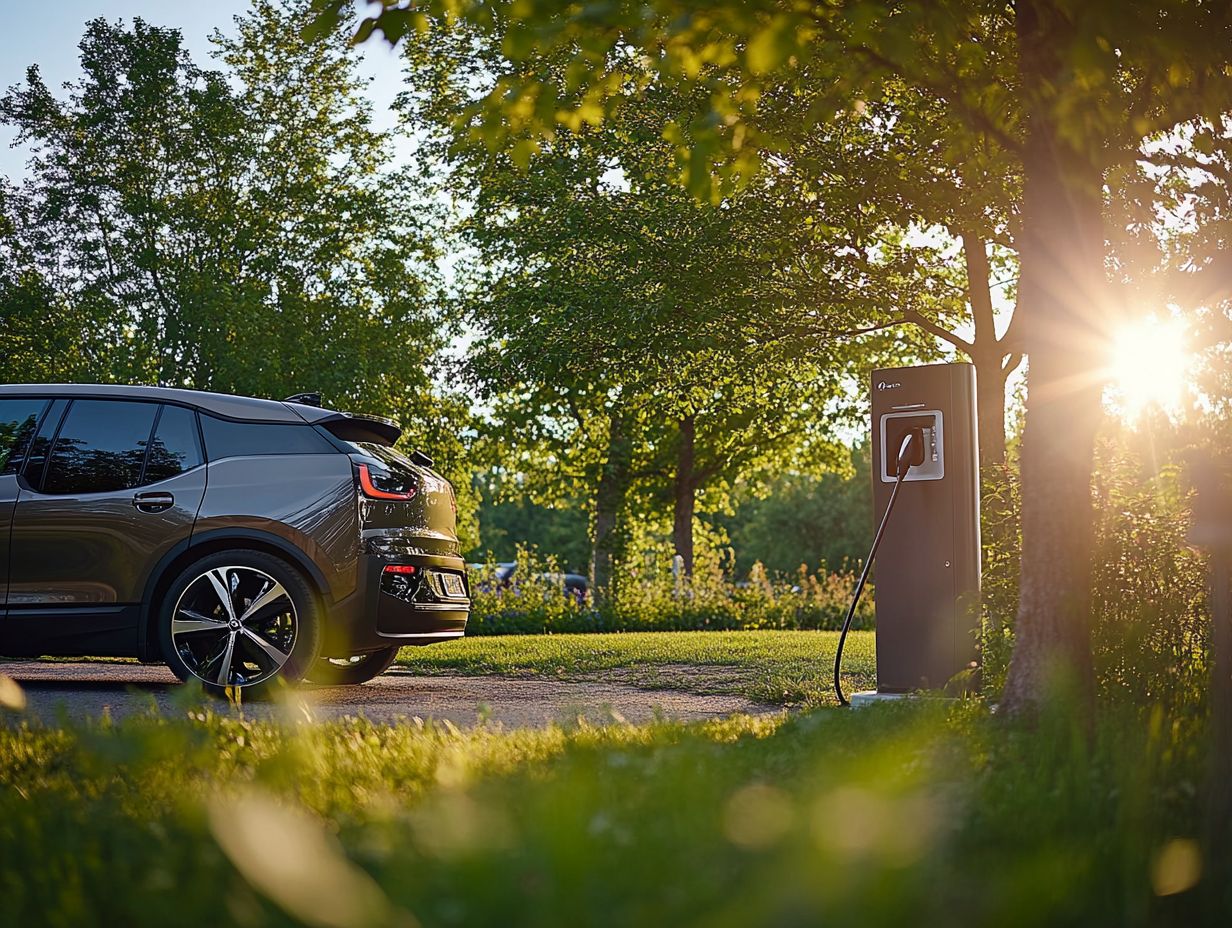
Understanding kilowatt-hours and the associated costs is essential for you as an electric vehicle owner striving to manage your charging expenses efficiently. A kilowatt-hour (kWh) is a unit of energy used to measure electricity consumption, and being aware of its cost gives you the power to make informed decisions about your electricity source and charging habits.
By calculating your total energy consumption in kilowatt-hours, you can gain valuable insights into your specific charging needs and associated costs. For example, if your electric vehicle has a battery capacity of 60 kWh and you need a full charge, the energy consumption aligns directly with what s required for a complete recharge. With a local electricity rate of $0.15 per kWh, charging your vehicle from empty to full would set you back roughly $9.
This knowledge is particularly important when comparing different electricity providers. Choosing a more efficient source can lead to significant savings over time. Charging during off-peak hours can lower costs and promote smarter energy use.
Ways to Reduce Charging Costs
Reducing charging costs is likely a priority for you as an electric vehicle owner. You can explore how to charge your EV while traveling to discover powerful strategies at your fingertips to achieve this goal.
By adopting smart charging habits, leveraging available incentives, and understanding the cost of home EV charging, you can significantly lower your overall charging expenses. Implementing these cost-saving measures could make a substantial difference in the long-term economics of your EV ownership experience.
Tips for Efficient Charging
To achieve efficient charging, you can adopt a range of tips and best practices that align with your charging habits and electricity rates. Optimal timing for charging like taking advantage of lower time-of-use rates can lead to significant savings and a more enjoyable charging experience.
Along with timing, selecting the right equipment is crucial for enhancing efficiency. Investing in a high-quality home charging station can dramatically reduce your charging time and improve energy conversion.
Being mindful of your electric rate plan and comparing offers from different providers can yield extra savings. Charge fully during off-peak hours to turbocharge your savings and limit frequent fast-charging sessions, as these can drive up costs and wear on your battery.
By employing these strategies, you can streamline your charging process and enjoy a more cost-effective and satisfying experience.
Alternative Charging Options
Exploring alternative charging options will help you slash costs as an electric vehicle owner. Community solar initiatives and access to a broad charging network provide additional avenues for charging, often at lower rates compared to traditional home setups, including exploring the cost of public EV charging.
Understanding these options empowers you to maximize savings. For instance, taking advantage of public charging incentives not only helps you lower expenses but also supports the expansion of charging infrastructure, making it more convenient for drivers like you.
Utilizing various charging networks allows for greater flexibility in choosing charging locations, enabling you to find the most economical options available. By leveraging these alternatives, you can ease your financial burden while contributing to a more sustainable energy ecosystem.
It s essential for you to stay informed about the latest developments in charging technologies and community initiatives that can facilitate your transition to greener transportation.
Frequently Asked Questions
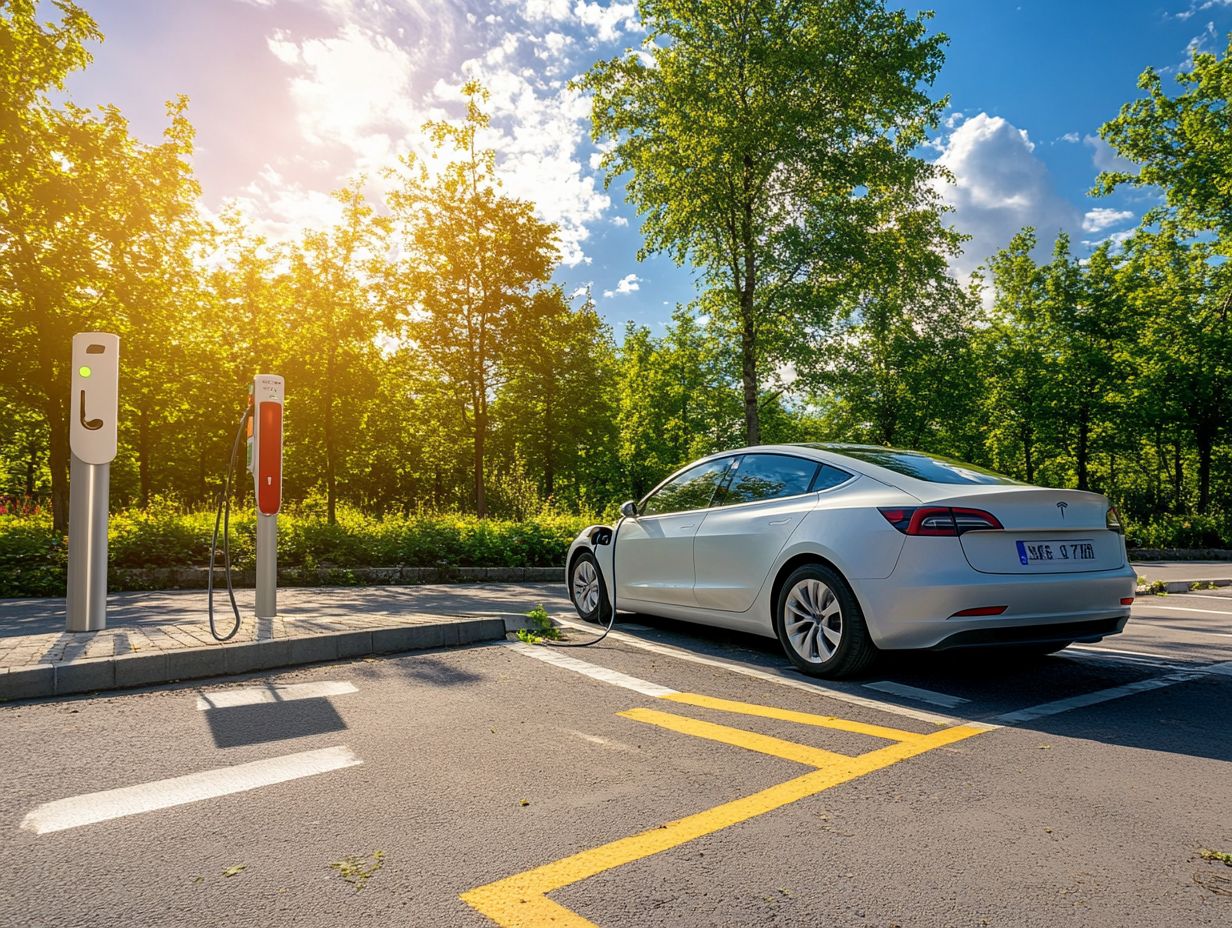
What are the different types of charging costs for EV owners?
- Home Charging: The cost of purchasing and installing a charging station in your home.
- Public Charging: Fees for using charging stations outside of your home.
- Fast Charging: Quicker options that typically incur higher costs per charging session.
Ready to save? Start exploring these strategies today!
How much does it cost to install a home charging station?
Installing a home charging station for your EV can cost between $500 to $2,000. This varies based on the type of charger, its location, and any electrical upgrades needed.
What are the average costs of public charging for EV owners?
Public charging costs can range from free to $0.25 per kilowatt-hour (kWh). Some stations charge a flat fee between $2 and $10 per session. Research your options to find the best deal.
What factors can affect the cost of charging an EV?
Charging costs depend on several factors. These include the type of charger, local electricity rates, charging times, and your vehicle’s battery size.
Are there any ways to reduce charging costs for EV owners?
Yes! You can find free public charging stations. Charging during off-peak hours can lower your electricity costs, too. Look into special EV programs from your utility company for even more savings.
What are the benefits of owning an EV in terms of charging costs?
EVs can save you money compared to traditional vehicles. They often have lower fuel costs, as electricity is usually cheaper than gas. Some states even offer tax incentives and rebates, making EV ownership even more attractive.

